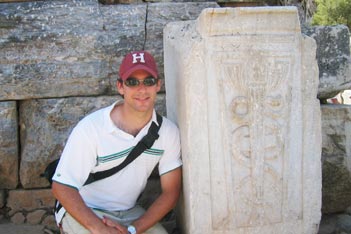Healthcare Management: Lessons Learned in the Scholarship in Surgery Program

Barry Cayen with a carving of the Rod of Asclepius (c. 300 AD) in Ephesus, Turkey
The advantage of having clinicians involved in healthcare management seems obvious:
they can help ensure that policy and management decisions are made using clinical
drivers -- while keeping clinician workflow in mind. The obvious disadvantage: up
until recently, many clinician managers had very limited management training. Financial
literacy, personnel or operations management knowledge were not prerequisites for
such positions. While an intelligent group, clinicians can be no more expected to
fix their cars than manage healthcare delivery without background training.
It was that disconnect which fuelled my interest to pursue a Master of Public Health
(MPH) in Healthcare Management. With the encouragement of Drs. Martin McKneally
and Bob Bell, the recommendations of Drs. Nizar Mahomed and David Backstein, and
Departmental support from Drs. Richard Reznick and Ben Alman through the Scholarship
in Surgery (SIS) Program, I earned my MPH at the Harvard School of Public Health
(HSPH) in 2006-2007.
|
There was much to learn from my colleagues at HSPH who, before entering the program
had provided medical relief to children in Africa, were Department Heads in their
home hospital, healthcare consultants or even hedge-fund managers. With our passion
for improving healthcare, we learned from our professors and one another while taking
courses such as The Financial Management and Analysis of Healthcare organizations,
Operations Management, Managing People in Healthcare and Competitive Strategy. At
the Brigham and Women's Hospital, I was fortunate enough to be involved in an economic
analysis of the Department of Orthopaedic Surgery as well as help perform an operating
room efficiency analysis.
One of the most interesting, albeit counterintuitive lessons I learned in the Operations
Management course was the strong effect that elective surgery admissions had on
Emergency Department overcrowding. Large swings in the daily volume of elective
admissions can lead to bottlenecks in hospital wards and ICUs which have many downstream
effects -- one of which is to back-up the Emergency Department. Surgeons can do
their part to temper the overcrowding crisis in our emergency rooms by working together
with operating room managers to control swings in daily volumes.
Currently in the second year of the SIS Program, I am working at a healthcare consulting
firm in Toronto. I have been given the opportunity to apply the skills I learned
at HSPH to projects such as a hospital information technology directive, a Provincial
e-Health strategy as well as diagnostic image sharing and surgical efficiency strategies.
While orthopaedic surgery remains my primary passion, I now have a new set of tools
which I can use to both help transform healthcare and keep our patients the first
priority.
Barry Cayen, MD, MSc, MPH
Resident, Division of Orthopaedic Surgery
Scholarship in Surgery Program
|